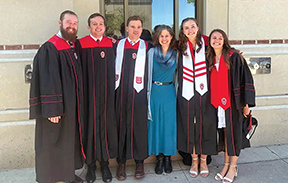
On Bascom Hill, standing among its leafy trees, is the UW-Madison Law School.
There, Professor of Law Cecelia Klingele has taught courses for the last 15 years, and as a practicing Catholic, it’s also where she has shared faith and fellowship with colleagues and students through her work.
Klingele is a wife, a mother of 11, and a parishioner of Our Lady of Guadalupe Pastorate in Madison, in addition to teaching courses in criminal law.
‘Authentically myself’
After stepping into Klingele’s modest upper floor office overlooking campus, it might appear similar to many of her colleagues’ — full of books, reminders on Post-it notes, posters of upcoming events, chocolates, and Kleenex — except that upon second glance, an observant Catholic will notice faith-related items decorate the neatly arranged room.
Scattered throughout, Klingele has placed pictures, quotes, and icons that, although subtle, are a commitment to being “authentically myself,” she said.
“It is always my goal to be authentic; to be authentic because one, it’s honest, and two, you’re always more approachable when you are yourself,” she continued.
“My students know that I’m Catholic,” she said, and as an extension of that authenticity, Klingele shares her faith on campus, first and foremost in the classroom.
There, Klingele teaches law students how to read statutes and cases, conduct research, and perform other practical tasks, but Klingele also challenges them to consider law’s “fundamental questions”.
Driven from her Catholic identity, Klingele questions them, asking, “How do we ensure justice while also ensuring human dignity?
“The language of criminal law from the very start, just struck me as so consonant with the language of our faith. Integrating it isn’t very difficult when you teach courses like I do,” Klingele said.
“Criminal justice uses words like ‘culpability’ and ‘blameworthiness’. We think about proportionality in our responses. We think about equity.
“All of these concerns are so deeply rooted in in our Judeo-Christian tradition,” she continued.
More than simply teaching the practical knowledge of being a competent lawyer, Klingele, as a Catholic professor, wants to “remind the students that there are people at the center of all these challenges. . . magnified on this stage that is the criminal system.”
Klingele said that her Catholic identity in the classroom is an “opportunity and privilege to invite my students to think deeply, to be more centered lawyers, and, also, to ask big questions about the world and themselves, as well as their legal work”.
Thomas More, encyclicals, and research
Klingele is involved in many other Catholic initiatives, too.
One example she remembered was from several years ago when students approached her, desiring to start a St. Thomas More Society, a Catholic law student organization, at UW-Madison.
“I was happy to help them,” she said, adding that “a lot of what students want are informal opportunities to connect with others and build community, whether around faith or just within the law school community.”
Now, she co-advises with Associate Dean Kevin Kelly, helping provide support to the Catholic group, which she happily described as student initiated and led.
Klingele also mentioned a new course she’s teaching.
In addition to teaching at the law school, she said “Last year, I began teaching a course for the Integrated Liberal Studies department at the university on the social encyclicals and books related to Catholic Social Thought.”
Klingele said that the course covers social encyclicals from Rerum Novarum to Fratelli Tutti, and that it introduces “students to the genre of encyclicals and to the way in which the Church’s comments accrete over time; [how] they become richer as the public conversation around different topics develops and deepens.”
“I want them to see how things get anticipated frequently, the challenges we face. We see them anticipated in encyclicals about 100 years before they happen. . . [I want the students to] consume those documents in a way that is both personal but also intellectual,” she said.
And another way Klingele engages her faith is in researching “the intersection of Catholic Social Thought and criminal justice reform in the United States,” and that she’ll bring her students in, too.
“I’ve been able to invite students [to] gatherings that both the Diocese of Madison and the Archdiocese of Milwaukee have held on criminal justice reform,” Klingele said, which she names as “legitimate areas of inquiry” for her research on community supervision issues, the mainstay of her work.
She added that “I’m blessed to work at a law school that really believes the university’s resources are to be put to the service of the state and the nation and the world, and that means we engage a lot more with the community, which includes institutes of faith.”
After graduating from her undergraduate studies, Klingele believed she would be a stay-at-home mother, and reflecting on that, she said, “I’ve been surprised by the path God took me on. I didn’t expect to be a lawyer. I didn’t expect to work for courts. I’m blessed to be here.
“This is now my 15th year back, and it is such a gift to be able to teach the same classes that I took and to explore these topics that have such deep resonance for me with just remarkably talented students.”
Do you know someone who shares their “faith at work” and serves to evangelize others? We want to tell their stories! Send your ideas to info@madisoncatholicherald.org.

